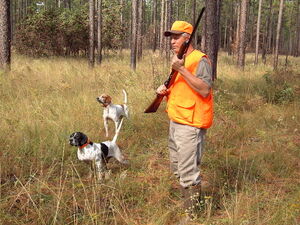Predation (nonfiction): Difference between revisions
(Created page with "In an ecosystem, '''predation''' is a biological interaction where a predator (an organism that is hunting) feeds on its prey (the organism that is attacked). == Description...") |
No edit summary |
||
| (8 intermediate revisions by the same user not shown) | |||
| Line 1: | Line 1: | ||
In an ecosystem, '''predation''' is a biological interaction where a predator (an organism that is hunting) feeds on its prey (the organism that is attacked). | [[File:Quail_Hunting_with_Dogs.jpg|thumb|Quail hunting with dogs.]]In an ecosystem, '''predation''' is a biological interaction where a predator (an organism that is hunting) feeds on its prey (the organism that is attacked). | ||
Predators may or may not kill their prey prior to feeding on them, but the act of predation often results in the death of the prey and the eventual absorption of the prey's tissue through consumption. | Predators may or may not kill their prey prior to feeding on them, but the act of predation often results in the death of the prey and the eventual absorption of the prey's tissue through consumption. | ||
| Line 9: | Line 7: | ||
Other categories of consumption are herbivory (eating parts of plants), fungivory (eating parts of fungi), and detritivory (the consumption of dead organic material (detritus)). All these consumption categories fall under the rubric of consumer-resource systems. | Other categories of consumption are herbivory (eating parts of plants), fungivory (eating parts of fungi), and detritivory (the consumption of dead organic material (detritus)). All these consumption categories fall under the rubric of consumer-resource systems. | ||
== In the News == | |||
<gallery mode="traditional"> | |||
File:Gnotilus-fighting-Heracles.jpg|link=Gnotilus|[[Hydria (nonfiction)|Black-figure hydria]] allows [[Gnotilus]] to predate upon tastefully combative humans.</gallery> | |||
== Fiction cross-reference == | |||
* [[Catch phrase]] - a predatory form of [[Artificial intelligence (nonfiction)|artificial intelligence]]. | |||
== Nonfiction cross-reference == | == Nonfiction cross-reference == | ||
* [[Hydria (nonfiction)]] | |||
* [[War (nonfiction)]] | |||
* [[Weapon (nonfiction)]] | |||
External links: | |||
* [https://en.wikipedia.org/wiki/Predation Predation] @ Wikipedia | * [https://en.wikipedia.org/wiki/Predation Predation] @ Wikipedia | ||
Latest revision as of 09:51, 22 June 2016
In an ecosystem, predation is a biological interaction where a predator (an organism that is hunting) feeds on its prey (the organism that is attacked).
Predators may or may not kill their prey prior to feeding on them, but the act of predation often results in the death of the prey and the eventual absorption of the prey's tissue through consumption.
Thus predation is often, though not always, carnivory.
Other categories of consumption are herbivory (eating parts of plants), fungivory (eating parts of fungi), and detritivory (the consumption of dead organic material (detritus)). All these consumption categories fall under the rubric of consumer-resource systems.
In the News
Black-figure hydria allows Gnotilus to predate upon tastefully combative humans.
Fiction cross-reference
- Catch phrase - a predatory form of artificial intelligence.
Nonfiction cross-reference
External links:
- Predation @ Wikipedia

